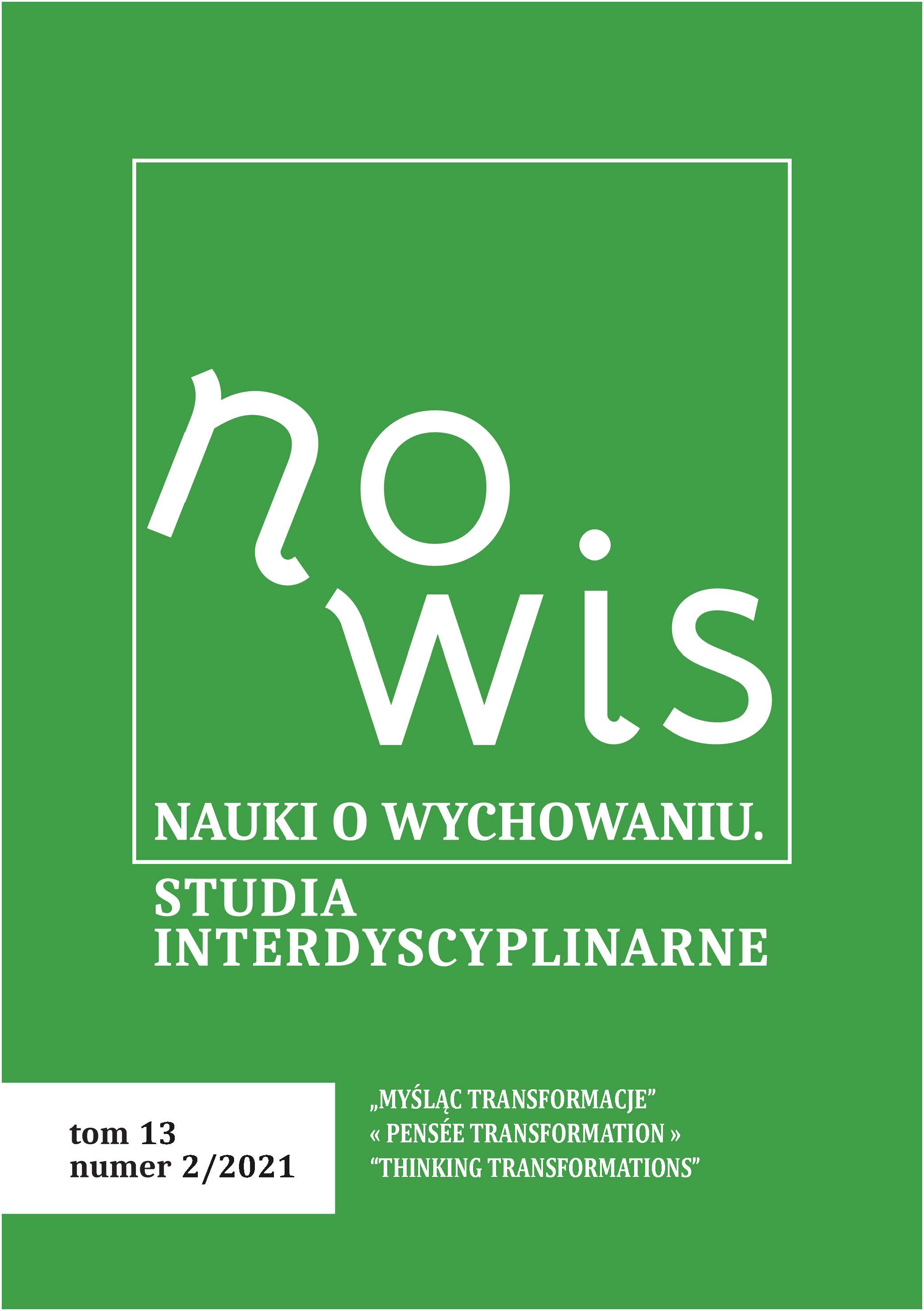Transformations dans les interactions : l’exemple des relations entre parents et enfants (LGBT+)
DOI :
https://doi.org/10.18778/2450-4491.13.12Mots-clés :
transformacje, wywiad narracyjny, rodzice, osoby LGBT , coming outRésumé
Le but de cet article est de reconstruire le processus de transformation qui a lieu dans les relations entre parent et enfant d’une orientation sexuelle ou d’une identité de genre non normative (LGBT+). Les transformations de soi et du réel se développent au cours des activités. L’identification des activités mentales, affectives et performatives, ainsi que les liens entre elles, permettent de reconstruire des tensions entre savoir, informations, vision du monde et émotions, sentiments et action entreprise. Ont participé à la recherche des parents de personnes LGBT+ de Pologne, au total 28 personnes, qui ont été sélectionnées selon la procédure dite de boule de neige, en tenant compte de la stratégie du contraste minimum et maximum résultant de la sélection théorique de l’échantillon. Le matériel empirique (récits autobiographiques) a été collecté à l’aide de la technique d’entretien narratif (F. Schütze), et ensuite élaboré au cours d’une analyse inductive et qualitative. Le cadre interprétatif de cet article est le concept de transformation du sujet au cours de l’activité (J.-M. Barbier). Les expériences communiquées dans les récits se réfèrent à la transformation des activités entreprises par le sujet, qui changent pendant et à travers l’activité. Au cours de la construction de leurs récits de vie, les parents interrogés ont fait des rétrospections sur les événements entrelacés, sur les activités entreprises et sur les émotions les accompagnant, ce qui a souvent déclenché un travail sur l’expérience. Les tissages reconstitués des activités mentales, affectives et performatives soulignent liens réciproques et tensions entre eux. Ce sont notamment : une (in)conscience de la souffrance de l’enfant ; un éprouvé et une compréhension de sa propre souffrance ; une confrontation affective au regard de ses représentations ; un travail sur l’expérience dans le contexte de tensions émotionnelles ; une expérience de (co) ressenti et de (co) compréhension ; un effort pour donner du sens à l’activité. Les changements mentaux identifiés l’étaient dans la perception et la compréhension du réel, dans les affects dynamisant l’activité du sujet, ils comprenaient l’analyse du processus des transformations produites en interaction.
Références
Barbier J.-M. (2015) Nowe wyzwania dla badań w naukach o wychowaniu: perspektywa działania/aktywności, tłum. G. Karbowska, „Nauki o Wychowaniu. Studia Interdyscyplinarne”, nr 1, s. 60–72.
View in Google Scholar
Barbier J.-M. (2016) Leksykon analizy aktywności. Konceptualizacje zwyczajowych pojęć, tłum. E. Marynowicz-Hetka, Łódź, Wydawnictwo Uniwersytetu Łódzkiego.
View in Google Scholar
Barbier J.-M. (2020) Konstruowanie aktywności i podmiotu w aktywności – wzajemne powiązania, tłum. G. Karbowska w: Pedagogika społeczna. Spotkania, trwanie i zmienność, pogranicza, A. Walczak, L. Telka, M. Granosik (red.), Łódź, Wydawnictwo Uniwersytetu Łódzkiego, s. 223−230.
View in Google Scholar
Baxter L. A. (2004) Relationships as dialogues, „Personal Relationships”, nr 11, s. 1–22, https://doi.org/10.1111/j.1475-6811.2004.00068.x
View in Google Scholar
DOI: https://doi.org/10.1111/j.1475-6811.2004.00068.x
Ben-Ari A. (1995) The discovery that an offspring is gay: Parents’, gay men’s, and lesbians’ perspectives, „Journal of Homosexuality”, nr 30 (1), s. 89–10, https://doi.org/10.1300/J082v30n01_05
View in Google Scholar
DOI: https://doi.org/10.1300/J082v30n01_05
Bernstein B. E. (1990) Attitudes and issues of parents of gay men and lesbians and implications for therapy, „Journal of Gay & Lesbian Psychotherapy”, nr 1 (3), s. 37–53, https://doi.org/10.1300/J236v01n03_03
View in Google Scholar
DOI: https://doi.org/10.1300/J236v01n03_03
Broad K. L. (2002) Social movement selves, „Sociological Perspectives”, nr 45 (3), s. 317–336, https://doi.org/10.1525/sop.2002.45.3.317
View in Google Scholar
DOI: https://doi.org/10.1525/sop.2002.45.3.317
D’Augelli A. R. (2005) Stress and adaptation among families of lesbian, gay, and bisexual youth: Research challenges, „Journal of GLBT Family Studies”, nr 1, s. 115–135, https://doi.org/10.1300/J461v01n02_07
View in Google Scholar
DOI: https://doi.org/10.1300/J461v01n02_07
D’Augelli A. R., Hershberger S. L., Pilkington N. W. (1998) Lesbian, gay, and bisexual youths and their families: Disclosure of sexual orientation and its consequences, „American Journal of Orthopsychiatry”, nr 68, s. 361–371, https://doi.org/10.1037/h0080345
View in Google Scholar
DOI: https://doi.org/10.1037/h0080345
D’Augelli A. R., Patterson C. J. (2001) Lesbian, gay, and bisexual identities and youth. Psychological perspectives, New York, Oxford University Press.
View in Google Scholar
DeVine J. L. (1984) A systemic inspection of affectional preference orientation and the family of origin, „Journal of Social Work & Human Sexuality”, nr 2, s. 9–17, https://doi.org/10.1300/J291V02N02_02
View in Google Scholar
DOI: https://doi.org/10.1300/J291V02N02_02
Eliason M. J. (1997) The prevalence and nature of biphobia in heterosexual undergraduate students, „Archives of Sexual Behavior”, nr 26, s. 317–326, https://doi.org/10.1023/A:1024527032040
View in Google Scholar
DOI: https://doi.org/10.1023/A:1024527032040
Eliason M., Raheim S. (1996) Categorical measurement of attitudes about lesbian, gay, and bisexual people, „Journal of Gay & Lesbian Social Services”, nr 4, s. 51–65, https://doi.org/10.1300/J041v04n03_03
View in Google Scholar
DOI: https://doi.org/10.1300/J041v04n03_03
Elo S., Kyngäs H. (2008) The qualitative content analysis process, „Journal of Advanced Nursing”, nr 62 (1), s. 107–115, https://doi.org/10.1111/j.1365-2648.2007.04569.x
View in Google Scholar
DOI: https://doi.org/10.1111/j.1365-2648.2007.04569.x
Fields J. (2001) Normal queers: Straight parents respond to their children’s coming out, „Symbolic Interaction”, nr 24 (2), s. 165–187, https://doi.org/10.1525/si.2001.24.2.165
View in Google Scholar
DOI: https://doi.org/10.1525/si.2001.24.2.165
Fish T., Rye B. (1991) Attitudes toward a homosexual or heterosexual persons with AIDS, „Journal of Applied Social Psychology”, nr 21, s. 651–667, https://doi.org/10.1111/j.1559-1816.1991.tb00541.x
View in Google Scholar
DOI: https://doi.org/10.1111/j.1559-1816.1991.tb00541.x
Glaser B. G., Strauss A. L. (1967) The Discovery of Grounded Theory. Strategies for Qualitative Research, Chicago, Aldine Publishing Com.
View in Google Scholar
DOI: https://doi.org/10.1097/00006199-196807000-00014
Gordon A., Meyer I. (2007) Gender nonconformity as a target of prejudice, discrimination and violence against LGB individuals, „Journal of LGBT Health Research”, nr 3, s. 55–71, https://doi.org/10.1080/15574090802093562
View in Google Scholar
DOI: https://doi.org/10.1080/15574090802093562
Górska P., Mikołajczak M. (2015) Tradycyjne i nowoczesne uprzedzenia wobec osób homoseksualnych w Polsce w: Uprzedzenia w Polsce, A. Stefaniak, M. Bilewicz, M. Winiewski (red.), Warszawa, Wydawnictwo Liberi Libri, s. 179–206.
View in Google Scholar
Graneheim U. H., Lindgren B. M., Lundman B. (2017) Methodological challenges in qualitative content analysis. A discussion paper, „Nurse Education Today”, nr 56, s. 29–34, https://doi.org/10.1016/j.nedt.2017.06.002
View in Google Scholar
DOI: https://doi.org/10.1016/j.nedt.2017.06.002
Heatherington L., Lavner J. A. (2008) Coming to terms with coming out: review and recommendations for family systems-focused research, „Journal of Family Psychology”, t. 22, nr 3, s. 329–343, https://doi.org/10.1037/0893-3200.22.3.329
View in Google Scholar
DOI: https://doi.org/10.1037/0893-3200.22.3.329
Hermanns H. (1987) Narrative Interview: A New Tool for Sociological Field Research w: Approaches to the Study of Face-to-Face Interaction, Z. Bokszański, M. Czyżewski (red.), „Folia Sociologica”, nr 13, Łódź, Wydawnictwo Uniwersytetu Łódzkiego, s. 43–56.
View in Google Scholar
Kimmel M. S. (2009) Masculinity as homophobia. Fear, shame, and silence in the construction of gender identity w: Sex, gender, and sexuality, A. Ferber, K. Holcomb, T. Wentling (red.), New York, Oxford University Press, s. 58–70, https://doi.org/10.4135/9781452243627.n7
View in Google Scholar
DOI: https://doi.org/10.4135/9781452243627.n7
Kübler-Ross E. (1969) On death and dying, New York, Macmillan.
View in Google Scholar
LaSala M. C. (2000) Lesbians, gay men, and their parents: Family therapy for the coming out crisis, „Family Process”, nr 39, s. 67–81, https://doi.org/10.1111/j.1545-5300.2000.39108.x
View in Google Scholar
DOI: https://doi.org/10.1111/j.1545-5300.2000.39108.x
McConahay J. B. (1986) Modern racism, ambivalence, and the modern racism scale w: Prejudice, discrimination and racism. Theory and research, S. L. Gaertner, J. Dovidio (red.), New York, Academic Press, s. 91–126.
View in Google Scholar
Muller A. (1987) Parents matter: Parents’ relationships with lesbian daughters and gay sons, United States, Naiad Press.
View in Google Scholar
Park C. L. (2010) Making sense of the meaning literature: An integrative review of meaning making and its effects on adjustment to stressful life events, „Psychological Bulletin”, nr 136 (2), s. 257–301, https://doi.org/10.1037/a0018301
View in Google Scholar
DOI: https://doi.org/10.1037/a0018301
Raja S., Stokes J. (1998) Assessing attitudes toward lesbians and gay men. The modern homophobia scale, „International Journal of Sexuality and Gender Studies”, nr 3, s. 113–134, https://doi.org/10.1023/A:1023244427281
View in Google Scholar
DOI: https://doi.org/10.1023/A:1023244427281
Robinson B. A. (2018) Conditional families and lesbian, gay, bisexual, transgender, and queer youth homelessness: Gender, sexuality, family instability, and rejection, „Journal of Marriage and Family”, nr 80 (2), s. 383–396, https://doi.org/10.1111/jomf.12466
View in Google Scholar
DOI: https://doi.org/10.1111/jomf.12466
Saltzburg S. (2004) Learning that an adolescent child is gay or lesbian. The parent experience, „Social Work”, nr 49, s. 109–118, https://doi.org/10.1093/sw/49.1.109
View in Google Scholar
DOI: https://doi.org/10.1093/sw/49.1.109
Savin-Williams R. C. (1989) Coming out to parents and self-esteem among gay and lesbian youths, „Journal of Homosexuality”, nr 18 (1–2), s. 1–35, https://doi.org/10.1300/J082v18n01_01
View in Google Scholar
DOI: https://doi.org/10.1300/J082v18n01_01
Savin-Williams R. C., Dubé, E. M. (1998) Parental reactions to their child’s disclosure of a gay/lesbian identity, „Family Relations. An Interdisciplinary Journal of Applied Family Studies”, nr 47 (1), s. 7–13, https://doi.org/10.2307/584845
View in Google Scholar
DOI: https://doi.org/10.2307/584845
Schütze F. (2008) Biography Analysis on the Empirical Base of Autobiographical narratives: How to analyse autobiographical narrative interviews. Part one, „European Studies on Inequalities and Social Cohesion”, nr 1/2, s. 153–242.
View in Google Scholar
Strauss A. L. (1969) Transforming of Identity w: A. L. Strauss, Mirrors and Masks. The Search for Identity, San Francisco, The Sociology Press, s. 89–118.
View in Google Scholar
Švab A., Kuhar R. (2014) The Transparent and Family Closets. Gay Men and Lesbians and Their Families of Origin, „Journal of GLBT Family Studies”, t. 10, nr 1–2, s. 15–35, https://doi.org/10.1080/1550428X.2014.857553
View in Google Scholar
DOI: https://doi.org/10.1080/1550428X.2014.857553
Worth H. (2003) The myth of the bisexual infector?, „Journal of Bisexuality”, nr 3, s. 69–88, https://doi.org/10.1300/J159v03n02_05
View in Google Scholar
DOI: https://doi.org/10.1300/J159v03n02_05
Worthen M. G. F. (2012) An Argument for Separate Analyses of LGBT+, „Sex Roles”, nr 68 (11–12), s. 703–723, https://doi.org/10.1007/s11199-012-0155-1
View in Google Scholar
DOI: https://doi.org/10.1007/s11199-012-0155-1
Téléchargements
Publiée
Comment citer
Numéro
Rubrique
Licence

Ce travail est disponible sous licence Creative Commons Attribution - Pas d'Utilisation Commerciale - Pas de Modification 4.0 International.





 Le site web de la revue, hébergé par l'équipe éditoriale de NOWIS se trouve sur la plate-forme Index Copernicus:
Le site web de la revue, hébergé par l'équipe éditoriale de NOWIS se trouve sur la plate-forme Index Copernicus: 





